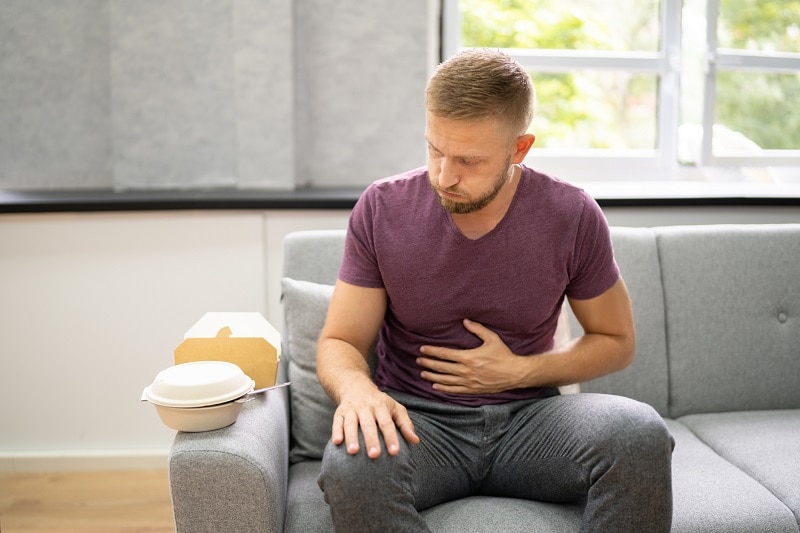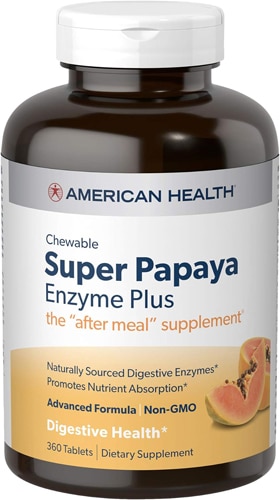[vc_row][vc_column][vc_column_text]Bloating is a common digestive discomfort that many people experience at some point in their lives. It is characterized by a feeling of fullness, tightness and discomfort in the abdomen. While bloating is usually temporary and harmless, it can be bothersome and impact an individual’s quality of life if the problem is persistent. If you find you’re constantly asking yourself, “Why am I so bloated?” keep reading to find the possible answers.

Why Am I so Bloated? 5 Causes to Consider
Bloating occurs when there is an excessive buildup of gas in the digestive system, causing the abdomen to feel distended and uncomfortable. Several factors contribute to this condition:
1. Digestion problems
Inadequate digestion of certain carbohydrates, such as lactose (found in dairy products) and fructose (found in fruits and some sweeteners), can lead to bloating. This is due to the inability of the body to break down these substances efficiently, causing fermentation by
gut bacteria and the production of gas.
2. Swallowing air
When we eat or drink too quickly, smoke, wear poorly fitting dentures, chew gum or drink carbonated beverages, air can accidentally be swallowed. This excess air can accumulate in the digestive tract, leading to bloating.
3. Overeating
Consuming large portions of food in one sitting can overload the digestive system, causing it to work harder and potentially result in bloating.
4. Food intolerances
Some individuals have
food intolerances, such as with gluten or lactose. When these foods are consumed, they can trigger an inflammatory response in the gut, leading to bloating.
5. Gastrointestinal disorders
Certain gastrointestinal disorders, such as
irritable bowel syndrome (IBS), inflammatory bowel disease (IBD) and small intestinal bacterial overgrowth (SIBO), are often associated with bloating. These conditions affect the normal functioning of the digestive system leading to an increased likelihood of bloating episodes.
How to Beat the Bloat: 7 Solutions to Try
Fortunately, several strategies can provide relief from bloating and promote better digestive health. Here are some effective methods to consider:
1. Identify and avoid trigger foods
Keep a
food journal to identify specific foods that consistently trigger bloating or discomfort. Common culprits include beans, lentils, broccoli, cabbage, onions, dairy products and artificial sweeteners. Adjusting the times you eat and decreasing serving sizes of trigger foods can help reduce bloating.
2. Eat smaller, more frequent meals
Instead of consuming large meals, try eating smaller more frequent meals throughout the day. This approach can aid digestion and prevent overloading the digestive system.
3. Slow down while eating
Practice
mindful eating by taking your time to chew food thoroughly. Avoid rushing through meals, as eating too quickly can lead to swallowing excess air, which contributes to bloating.
4. Be mindful of carbonated beverages
Carbonated beverages, including sodas, sparkling water, and beer, can introduce additional gas into the digestive system. Opt for non-carbonated alternatives or drink in moderation to minimize bloating.
5. Stay hydrated
Drinking adequate amounts of water during the day helps prevent constipation, which can contribute to bloating. Aim for at least eight glasses of water daily and limit the intake of dehydrating beverages such as alcohol and caffeine.
6. Exercise regularly
Physical activity promotes better digestion by stimulating bowel movements and reducing bloating. Engaging in activities such as
walking,
cycling or
yoga can be beneficial for alleviating bloating symptoms.
7. Try over-the-counter remedies
There are several over-the-counter products available that can help provide relief from bloating. It’s always recommended to consult with your healthcare provider before trying any new medications or supplements. Here are some commonly used over-the-counter options:
- Simethicone: Simethicone is an over-the-counter medication that helps break down gas bubbles in the digestive tract. It can be found in various forms, such as tablets, chewables or liquid drops. Simethicone works by reducing the surface tension of gas bubbles, making them easier to pass and reducing bloating and discomfort.
- Digestive enzymes: Digestive enzyme supplements contain enzymes that help break down carbohydrates, proteins and fats in the digestive system. They may help support digestion and ease bloating, especially if bloating is caused by poor digestion of certain foods.†
- Probiotics: Probiotics are beneficial bacteria that may help support gut health and digestion. They are available in various forms, including capsules, tablets, powders and fermented foods. Probiotics work by helping to restore balance of gut bacteria, which may help alleviate bloating associated with an imbalance in healthy gut microbiota.†
- Activated charcoal: Activated charcoal is a natural substance that may help absorb gas in the digestive system, potentially helping with bloating. It is available in capsule or powder form. However, it’s important to note that activated charcoal can also absorb medications and nutrients, so it’s best to take it separately from other supplements or medications.†
- Antacids: Some antacids, typically used for relieving heartburn or acid reflux, may also help with bloating caused by excess stomach acid. They work by neutralizing the acid in the stomach, which can reduce gas and bloating symptoms. Look for antacids containing ingredients such as calcium carbonate, magnesium hydroxide or aluminum hydroxide.
Remember, it’s important to read and follow the instructions on the product labels and consult with your healthcare provider if you have any underlying health conditions or if your symptoms persist or worsen. Please note that the effectiveness of these over-the-counter products may vary depending on the individual and underlying cause of bloating. It’s always advisable to consult a healthcare professional for personalized advice and recommendations based on your specific needs.
Bloating is a common condition that can be caused by various factors. While occasional bloating is normal, chronic or severe boating should be addressed. By implementing dietary and lifestyle modifications it is possible to find relief from bloating and improve overall digestive health. If symptoms persist or worsen, seeking medical advice is crucial for a proper diagnosis and appropriate treatment.
†These statements have not been approved by the Food and Drug Administration. These products are not intended to diagnose, treat, cure or prevent disease.[/vc_column_text][/vc_column][/vc_row][vc_row][vc_column][vc_text_separator title="Featured Products" border_width="2"][vc_row_inner equal_height="yes" content_placement="middle" gap="35"][vc_column_inner width="1/3"][vc_single_image image="168575" img_size="full" alignment="center" onclick="custom_link" img_link_target="_blank" css=".vc_custom_1693593987215{padding-right: 7% !important;padding-left: 7% !important;}" link="https://www.vitacost.com/goli-nutrition-pre-pro-post-biotic-gummie"][/vc_column_inner][vc_column_inner width="1/3"][vc_single_image image="168576" img_size="full" alignment="center" onclick="custom_link" img_link_target="_blank" css=".vc_custom_1693594003295{padding-right: 7% !important;padding-left: 7% !important;}" link="https://www.vitacost.com/solaray-activated-charcoal"][/vc_column_inner][vc_column_inner width="1/3"][vc_single_image image="168577" img_size="full" alignment="center" onclick="custom_link" img_link_target="_blank" css=".vc_custom_1693594017646{padding-right: 7% !important;padding-left: 7% !important;}" link="https://www.vitacost.com/zenwise-no-bloat"][/vc_column_inner][/vc_row_inner][/vc_column][/vc_row]




